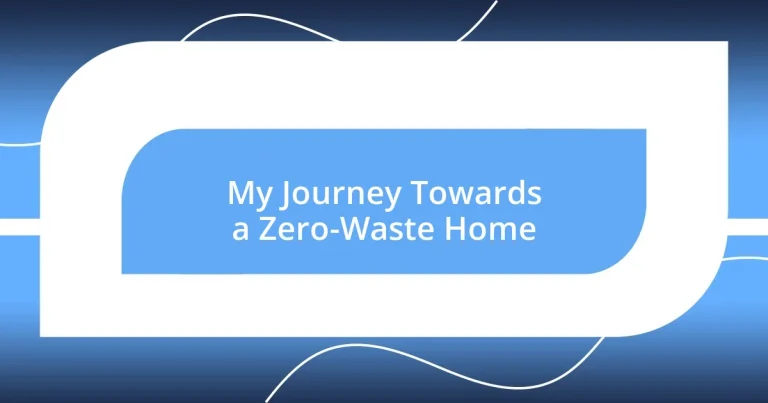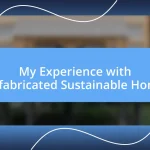Key takeaways:
- Zero-waste living emphasizes the “5 R’s” (Refuse, Reduce, Reuse, Recycle, Rot) to minimize waste and foster empowerment through conscious consumption.
- Setting realistic, achievable goals and tracking progress are vital for sustaining motivation and effectively transforming waste practices.
- Community support and resourcefulness, such as repurposing items and composting, enhance the zero-waste journey and connect individuals to their impact on the environment.
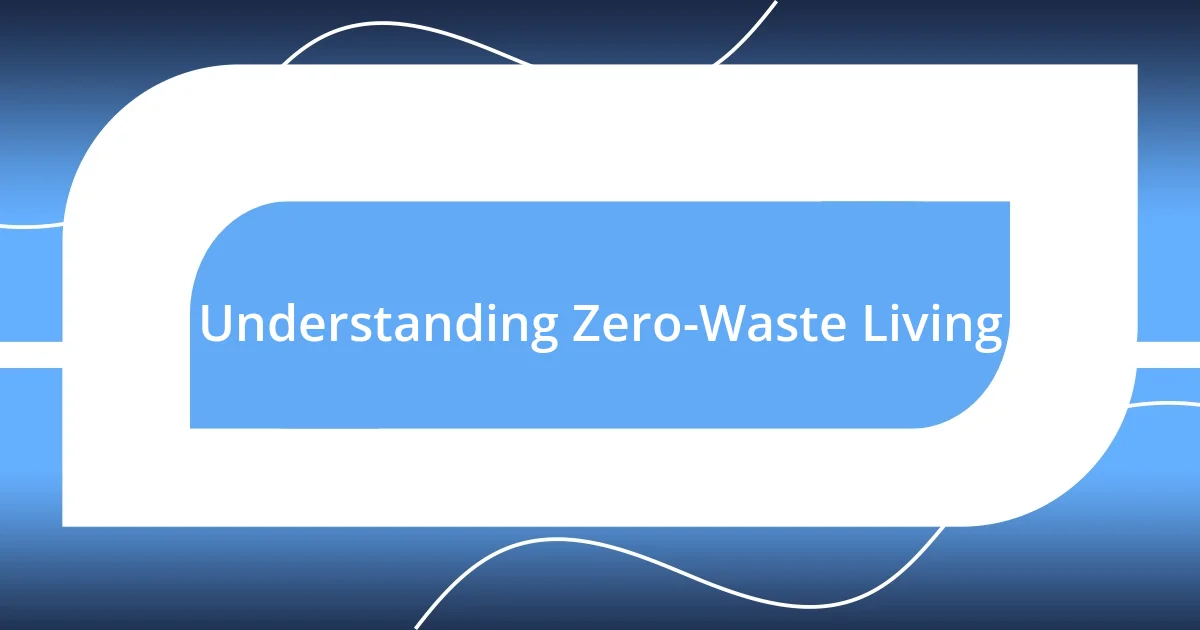
Understanding Zero-Waste Living
Zero-waste living is more than just a trend; it’s a commitment to reducing our environmental footprint by minimizing waste and rethinking our consumption habits. I remember my first foray into this lifestyle—I was overwhelmed by the sheer amount of waste I generated daily. Have you ever stopped to consider how much packaging you throw away each week? It’s astonishing.
At its core, zero-waste living revolves around the principle of keeping resources in use for as long as possible; this is often encapsulated in the “5 R’s” framework: Refuse, Reduce, Reuse, Recycle, and Rot. I found that when I began to refuse single-use plastics, it not only lightened my trash load but gave me a sense of empowerment. Isn’t it invigorating to make choices that benefit both you and the planet?
The emotional journey can also be profound. Adopting this lifestyle means confronting our habits and the convenience culture that surrounds us. I have found myself feeling more connected to my community through local swaps and markets, turning what once seemed like sacrifices into joyful activities. Have you ever felt that same sense of satisfaction from a small, positive change? You might be surprised at how fulfilling it can be.
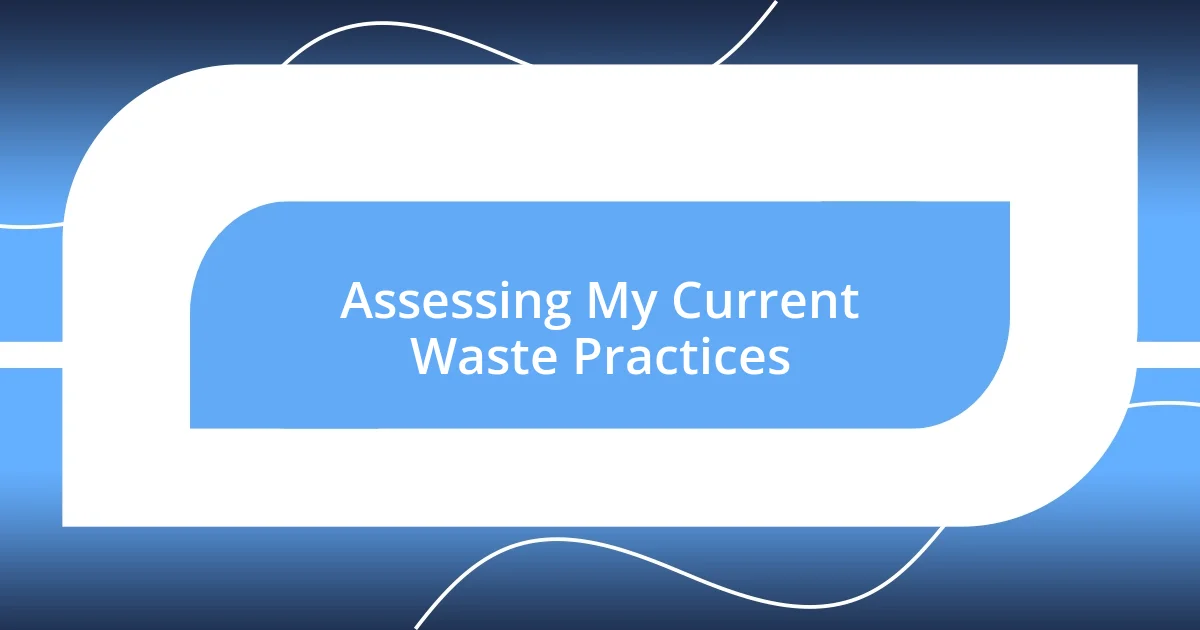
Assessing My Current Waste Practices
Assessing my current waste practices has been quite an eye-opener. The first step was tracking the type and amount of waste I generate weekly. I started keeping a log, surprise after surprise came my way: a huge portion consisted of food packaging, much of which could be avoided. It made me realize that by simply being mindful, I could make a significant impact.
I also took a closer look at my recycling habits. Initially, I assumed I was diligent, but the truth was disheartening. I discovered that I often mixed non-recyclables into the bin out of convenience, which defeated the purpose. This prompted me to set up a dedicated space at home to sort waste properly, ensuring I truly uphold the recycling principle. Have you ever experienced the realization that small changes in habit can lead to larger shifts in your impact?
Reflecting on my consumption habits has been enlightening as well. Bills from take-out food and packaging piled up musty memories of convenience, but I now cherish the moments spent meal-prepping. It connects me to my food, reduces waste, and offers a sense of accomplishment. If I can simplify my life and positively impact the planet, isn’t it worth the effort?
| Waste Category | Amount per Week |
|---|---|
| Food Packaging | 5-6 bags |
| Single-Use Plastics | 3-4 items |
| Compostable Waste | 2 bags |
| Recyclables | 1 bag |
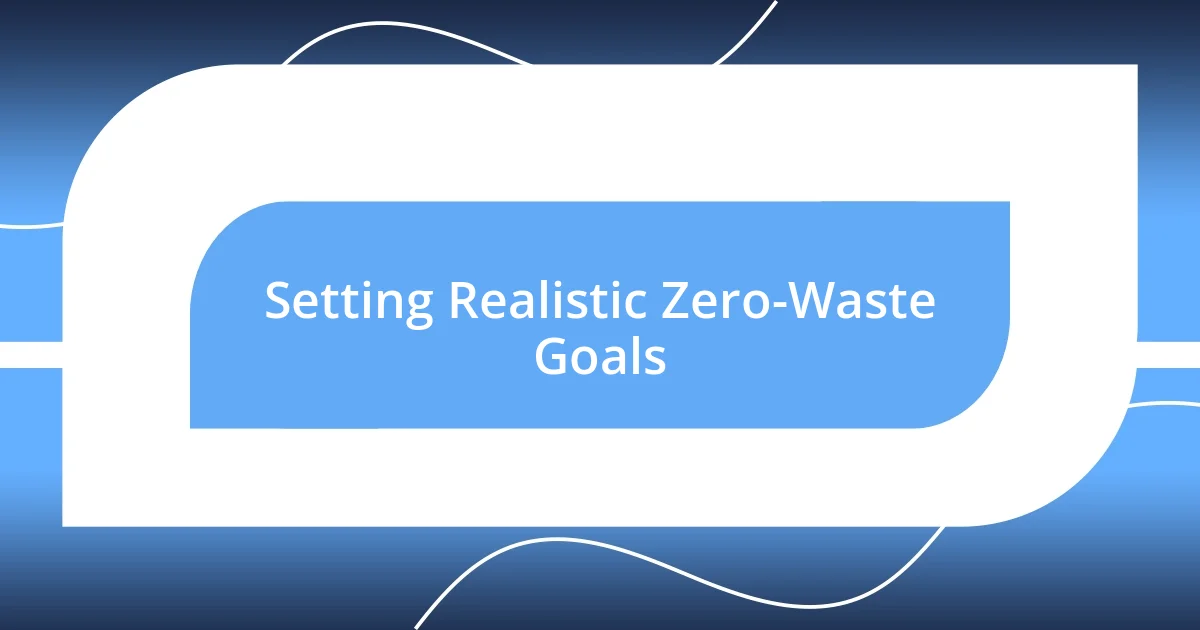
Setting Realistic Zero-Waste Goals
Setting goals for a zero-waste lifestyle can often feel daunting, but it’s important to approach this journey with realistic expectations. When I first began, I ambitiously aimed for an immediate, complete overhaul of my habits, but quickly learned that a gradual approach led to far more lasting changes. It’s about progress, not perfection. I recommend breaking down your long-term goals into smaller, manageable steps, which can be incredibly motivating.
Here are some practical tips to help set realistic zero-waste goals:
- Start with one area of focus, like reducing food waste or eliminating single-use plastics.
- Set a timeline for each goal—perhaps aim to make a change every month.
- Track your progress and celebrate small victories, like reducing plastic use by 50% in a month.
- Be flexible and kind to yourself; setbacks are a normal part of this journey.
- Connect with others in the zero-waste community for support and inspiration.
By approaching these goals thoughtfully, I’ve found a rhythm that works for me, gradually making sustainability a natural part of my daily routine. The emotions connected to these changes, like pride in my decisions and excitement over new discoveries, really enhance the experience and keep me motivated to continue.
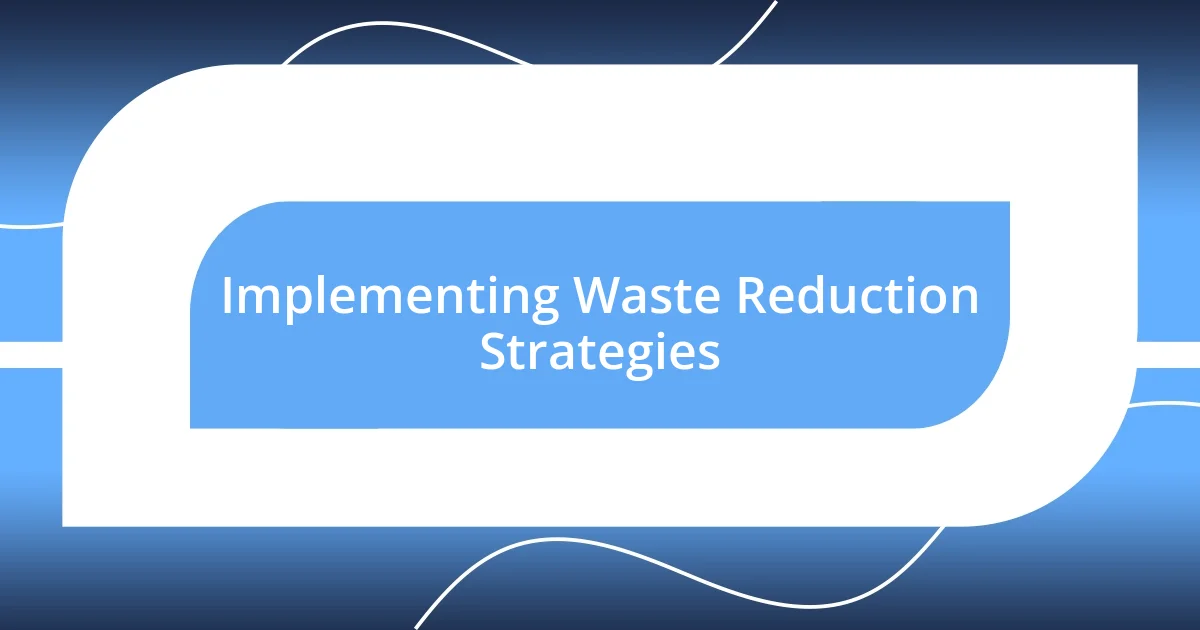
Implementing Waste Reduction Strategies
One of the most effective strategies I implemented was creating a meal plan for the week. It may seem simple, but dedicating time each Sunday to plan what I would cook not only reduced my food waste significantly but also cut down on impulse buys at the grocery store. Have you ever noticed how a little organization can lead to major savings? I found myself pleasantly surprised as my shopping list grew shorter and my waste decreased.
I began to explore alternatives that replaced common single-use items in my home. For instance, I swapped paper towels for reusable cloths and invested in glass containers for storing food. The shift not only felt good on a personal level—it was like adopting a new lifestyle—but also made such a difference in my waste output. I never thought a simple switch in storage could spark such joy, but the satisfaction that came with it was tangible. Isn’t it fascinating how a few small changes can infuse your life with purpose?
Moreover, I discovered the joy of DIY solutions. One weekend, I decided to make my own cleaning products from natural ingredients, which not only cut down on plastic bottles but also made my home less toxic. As I poured essential oils into a spray bottle, I felt empowered and amazed at how easy this was! Doesn’t it feel fantastic to know exactly what’s in your cleaning supplies? These strategies helped me realize that reducing waste can be a creative and enriching process.
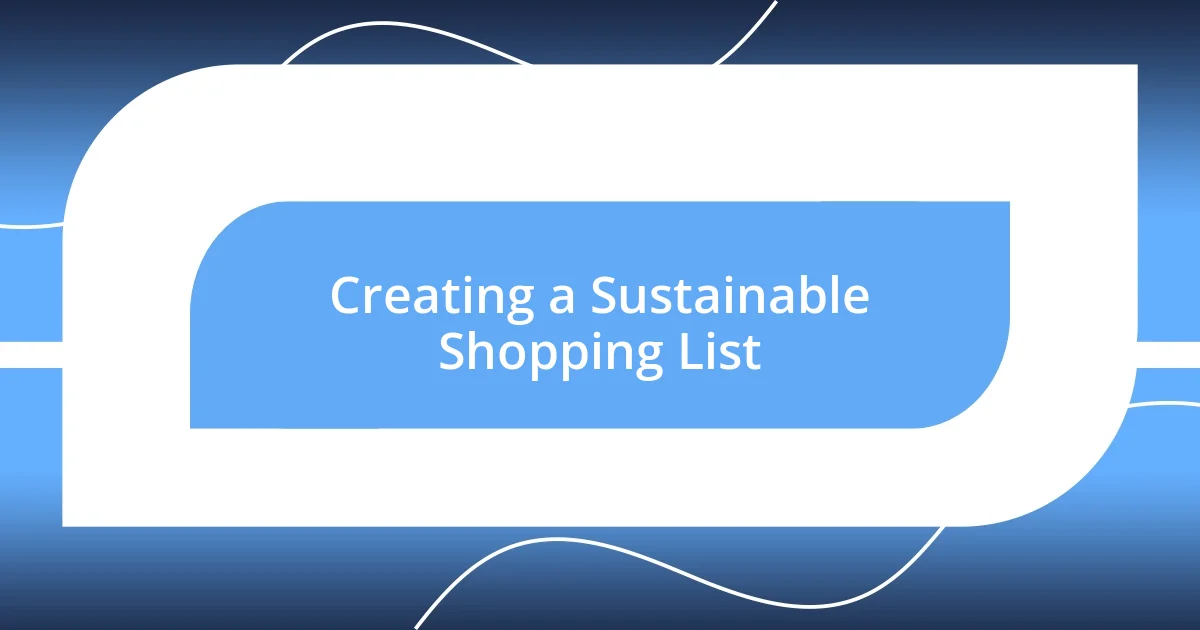
Creating a Sustainable Shopping List
Creating a sustainable shopping list is about more than just avoiding waste—it’s a mindset shift that can be genuinely exciting. When I started crafting my lists, I made a point to include only essentials, but here’s the twist: I began to jot down local suppliers and farmers’ markets as well. It wasn’t just a shopping list; it became a tool for connection. Every time I found a locally sourced item, I felt a surge of pride—not just in supporting my community, but also in knowing that what I bought had a lower carbon footprint. Have you ever felt the joy of picking out fresh produce that wasn’t wrapped in plastic?
As I refined my sustainable shopping list, I also discovered the importance of seasonal buying. Exploring what’s in season not only ensured I was choosing fresh ingredients, but it also significantly cut costs. I can vividly recall the first time I bought a basket of strawberries directly from a farm; they were bursting with flavor! The moment I tasted one, I understood that sustainability and flavor often go hand in hand. By adjusting my list to prioritize seasonal produce, I not only reduced packaging waste but also invigorated my meals with vibrant, tasty options. How does that kind of freshness sound to you?
Sustainability also led me to embrace bulk shopping. Initially, I was intimidated by the idea of using my own containers in stores, but the freeing experience of ditching plastic bags was a game changer. The first time I filled my reusable jar with grains, I felt like I had unlocked a secret treasure of options, and I couldn’t help but smile thinking about the reduction in packaging waste. It made buying in bulk feel like an adventure, and I found myself experimenting with new ingredients I hadn’t previously considered. Who would have thought that shopping could turn into such a fun exploration of flavors and sustainability?
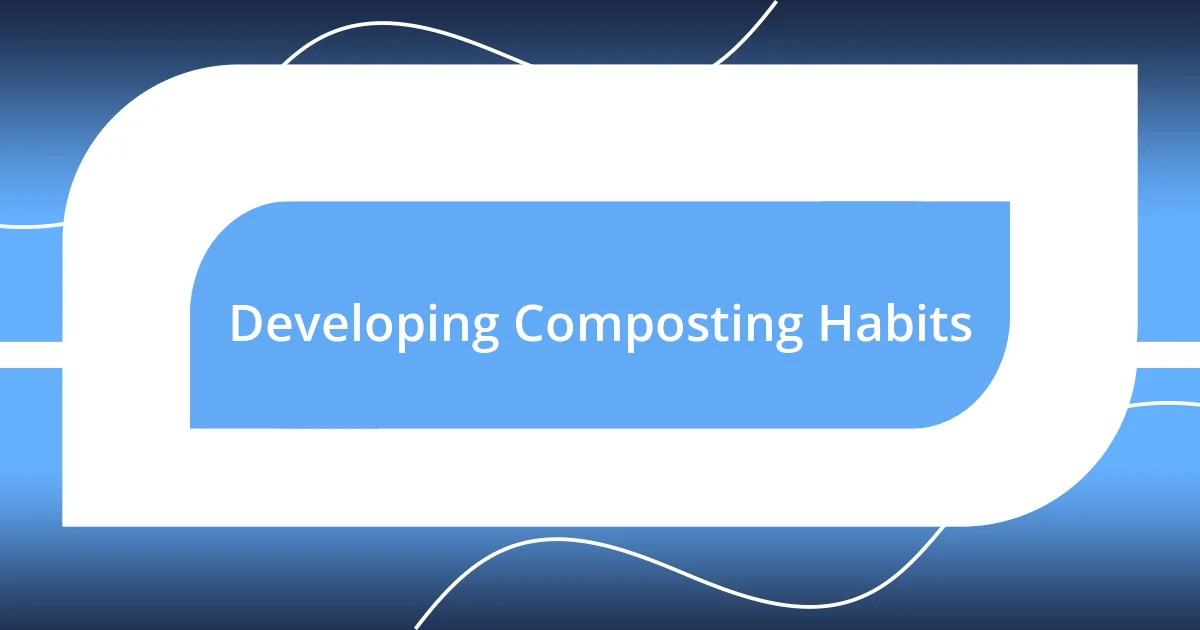
Developing Composting Habits
Developing my composting habits transformed my kitchen into a vibrant hub of organic recycling. I remember the first time I set up my compost bin; it felt like an exciting experiment. With each layer of vegetable scraps and coffee grounds, I saw potential—potential to nourish my garden instead of adding to the landfill. Have you felt that thrill when taking a step towards something sustainable?
Every day, I made it a ritual to collect compostable waste, and it’s incredible how quickly it became second nature. I keep a small container on my counter, and whenever I chop veggies or finish a fruit, I toss the scraps in without even thinking about it. At first, I worried about odors or pests, but with a bit of care—like ensuring a good mix of greens and browns—I found my compost bin to be surprisingly low-maintenance. Does it surprise you how effortless it can be once you get the hang of it?
The real joy came when I began to see the results of my efforts. After a few months of composting, I harvested rich, dark compost and sprinkled it into my garden. That moment when I witnessed my plants thriving on the nutrients from my kitchen waste was nothing short of magical. It’s striking how something so small, like a compost bin, can create such a profound sense of connection to nature. Have you ever experienced the satisfaction of turning waste into something that nurtures life?
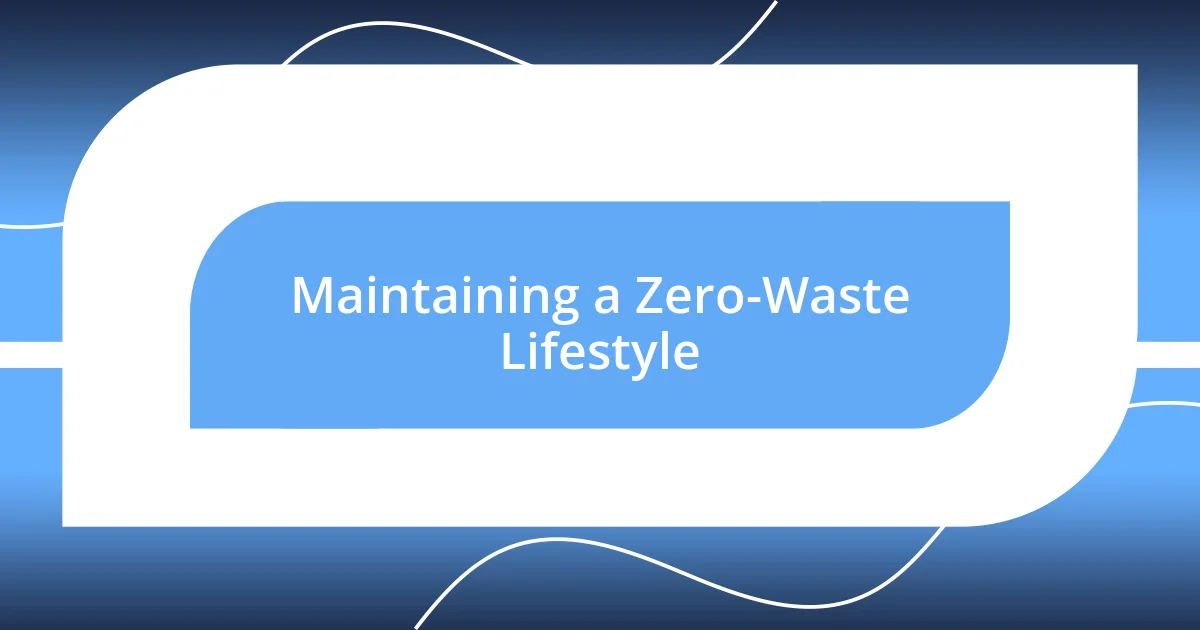
Maintaining a Zero-Waste Lifestyle
Maintaining a zero-waste lifestyle requires a commitment to mindful consumption, which often means finding innovative ways to repurpose items. I remember when I got the idea to use glass jars for storage instead of buying new containers. Not only did this save me money, but it also gave my kitchen a unique, eclectic feel. Have you ever noticed how reusing can add character to your space while reducing waste?
Another essential aspect is building a supportive community. Initially, I felt like a lone wolf in my zero-waste journey, but joining local groups made a significant difference. Sharing tips and finding like-minded friends reinvigorated my commitment, and I could see the positive impact we were making together. It’s rewarding to exchange experiences and challenges—have you thought about how a community can amplify your own efforts?
Lastly, I found that setting achievable goals kept my motivation alive. At first, I aimed to reduce my waste by 50%, and then I challenged myself to go even further. Each milestone felt like a mini-celebration, reminding me that progress, no matter how small, deserves recognition. Reflecting on my journey, I’ve learned that maintaining a zero-waste lifestyle is as much about personal growth as it is about reducing waste. How do you celebrate your wins along the way?












